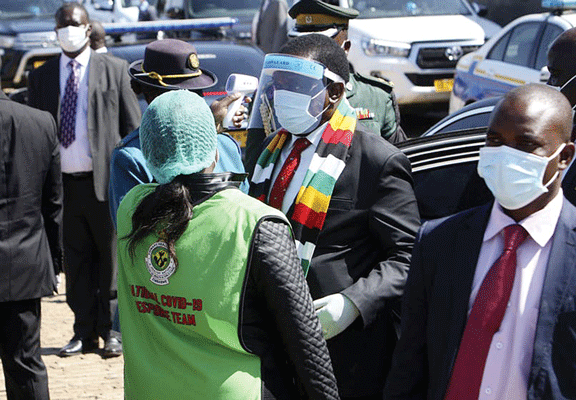
WHEN the late Robert Mugabe was ousted as President of Zimbabwe in a coup in November 2017, many in the country hoped for an end to the repression and mismanagement that had characterised his 37 years in office.
But when protesters tried to gather on Friday in the capital, Harare, the security services reacted in a manner reminiscent of the Mugabe era.
They shut down most of the city, arrested several government critics and forced more than a dozen others into hiding — highlighting how the country has, in the eyes of the opposition, slipped from bad to worse under Mugabe’s successor, Emmerson Mnangagwa.
Mnangagwa took power on a promise of renewal, but his critics associate him with the same excesses that defined Mugabe’s legacy: authoritarian rule, financial missteps, rampant graft, plummeting living standards and a teetering economy.
“In reality, there is nothing new,” said MDC Alliance youth leader Obey Sithole, who went into hiding days before the planned protests. “Instead, we have seen the perfection of the art of repression.”
And the government’s halting response to the coronavirus pandemic, which has exposed the awful state of the country’s health care system and led to further allegations of corruption, has fuelled widespread anger.
In an interview with the New York Times last year, Mnangagwa (77) described himself as a leader with a “new dispensation”. But in some respects, Mnangagwa — a veteran of the guerrilla war that ended white-minority rule, and one of Mugabe’s most trusted sidekicks — has proved to be an even harsher President than Mugabe.
The number of opposition activists charged with a form of treason during Mnangagwa’s three years in office is already higher than during Mugabe’s entire tenure, according to research by a coalition of 22 Zimbabwean rights groups.
- Chamisa under fire over US$120K donation
- Mavhunga puts DeMbare into Chibuku quarterfinals
- Pension funds bet on Cabora Bassa oilfields
- Councils defy govt fire tender directive
Keep Reading
Opposition activists hoped to hold mass rallies on Friday, partly in response to a new wave of arrests and abductions that began in May, when three female opposition activists, including a lawmaker, were abducted, beaten and sexually assaulted by people they say were plainclothes government agents.
The government denied involvement, and after being treated in a hospital, the women were charged with false accusations.
But Mnangagwa’s government refused to allow even this largely symbolic expression of dissent.
To deter protesters in the prelude to the demonstrations, police seized the leader of an opposition group who had been helping to organise the rally, Jacob Ngarivhume, and a prominent investigative journalist, Hopewell Chin’ono, who had helped reveal a possible corruption scheme involving the country’s fired Health minister, Obadiah Moyo.
More than a dozen opposition politicians, activists and union leaders, including Sithole, then went into hiding after police named them on a wanted list.
And on Friday, the police deployed personnel across the city, shutting down most major transit routes and deterring most would-be protesters from gathering.
Several of those who did try to assemble were detained, including author Tsitsi Dangarembga, three days after her novel This Mournable Body was longlisted for the Booker Prize, a prestigious British literary award. Dangarembga was released on bail Saturday.
“During President Mugabe’s era, there were serious, gross human rights violations,” said Robson Chere, head of a major teachers’ union and one of those now in hiding. “But the current so-called new dispensation has gone several gears up.”
The situation has led to tensions within Mnangagwa’s political party. A top Zanu PF official, Claveria Chizema, was suspended last week after being accused of helping to promote the protests, and the government itself has been forced to deny that the military that brought Mnangagwa to power was now seeking to oust him.
Those hoping to demonstrate on Friday had an extra grievance: Mnangagwa’s handling of the coronavirus crisis, which critics see as reflective of his government’s wider faults.
Already close to collapse before the pandemic, hospitals lack enough drugs, ventilators, personal protective equipment and staff, because many doctors and nurses have moved abroad in search of better pay or gone on strike to protest their low wages.
Moyo was fired as Health minister in July after buying coronavirus supplies at inflated prices through a multi-million-dollar contract with an obscure foreign firm that was signed without the approval of the relevant State authorities, according to court documents.
Moyo, who has yet to be replaced, was arrested and is on trial.
“The system has collapsed under our President,” said Peter Magombeyi, a former head of the Zimbabwe Hospital Doctors Association, a doctors labour union.
“We are noticing that there are no doctors, there are no nurses, there are no drugs, not enough personal protective equipment, no hospital chief executive officers, no Health Care minister.”
The leadership of Mnangagwa’s party had urged supporters to “take on” the protesters and attempted to portray the possibility of demonstrations as a Western plot.
“None of it is coming from Zimbabweans,” said Tafadzwa Mugwadi, the ruling Zanu PF party’s director of information.
But in reality, there is plenty of homegrown anger — not only about rights violations but also about the dire state of the health system and deteriorating living conditions. Corruption and mismanagement have led to the collapse of the economy and vast under-investment in infrastructure. — Star Tribune











